10 Must Read Books About Time Management


How do you manage your time? For a good reason, many individuals are concerned about this. We only have 24 hours a day, and making the most of them is crucial.
That’s why books about time management are so popular. There are many strategies, and everyone can find one that works best for them.
This article will discuss 10 of the best books about time management. Let’s read these!
Time management and why is it critical?
“Time management is attention management. That’s why managing your work is a matter of focus, not making an ironclad schedule. Focusing your attention maximizes your time – and that increases your motivation. It’s a productive cycle that feels really, really good.” Aytekintank.
Time management is controlling how you spend your time to achieve specific goals. It involves setting priorities, making a schedule, and sticking to it.
Time management is crucial because it helps you focus on what’s important, get more done in less time, and achieve your goals. You procrastinate, miss deadlines, and feel overwhelmed if you don’t manage your time effectively.
Time management is essential if you want to be successful in whatever you do.
One of the most effective ways to manage your time is to focus on deep work. Deep work is an approach to work that encourages you to focus on a single task for an extended period.
To be successful with deep work, you need to have clear goals, focus on one task at a time, eliminate distractions, and take breaks when needed.
If you can focus and avoid distractions, you will be able to achieve more accomplishments in less time. This will help you achieve your goals.
The different types of time management strategies
In our distracted world, time management has become more critical than ever. Here are some strategies for time management:
The Pomodoro Technique.
Francesco Cirillo developed this time management strategy in the 1980s. The fundamental concept is to reduce work into small chunks of 25 minutes plus short rests.
After four intervals, you take a break that is 15-20 minutes long. The Pomodoro Technique is a great way to stay focused and avoid burnout.
Time Blocking.
Time blocking is a great way to structure your day and ensure that you have time for everything important to you.
To time block, decide what tasks you need to accomplish during each hour or block of time on your calendar.
Set a timer and get to work! Time blocking helps you stay focused and make the most of your time.
The Eisenhower Matrix.
U.S. President Dwight D. Eisenhower developed this time management strategy. His matrix is a way of categorizing tasks by urgency and importance. Urgent tasks are those that need to be done immediately, while important tasks are those that contribute to your long-term goals.
To use the Eisenhower Matrix, draw a grid with four squares. Label the first square “urgent and important,” the second “not urgent but important,” the third “urgent but not important,” and the fourth “not urgent and not important.”
Then, start with the urgent and essential tasks and work your way down. This matrix helps organize your tasks and ensure you complete the most critical activities.
The rule of 50/30/20.
The rule of 50/30/20 is a simple way to budget your time. The basic idea is to spend 50% of your time on essential tasks, 30% of your time on non-essential but necessary tasks, and 20% of your time on leisure activities.
This rule can help ensure that you’re spending your time aligning with your goals and priorities.
The 80/20 Rule.
The 80/20 rule is also known as the Pareto Principle. This time management strategy states that 80% of your results come from 20% of your efforts.
In other words, you can get a lot done by focusing on the most important things. To use the 80/20 rule, identify the 20% of tasks that give you the most results and focus your time and energy on these tasks.
You can also use the 80/20 rule to delegate or outsource tasks that are not as important—your time for the things that matter most.
The Pomodoro Technique, time blocking, the Eisenhower Matrix, the 50/30/20 rule, and the 80/20 rule are all great time management strategies that can help you make the most of your time.
Remember, everyone has 24 hours in a day. It’s up to you to use your time wisely!
10 The Best of Time Management Books.
You can read one of the tens of the best time management books to improve your time management skills:
“Atomic Habits” by James Clear.
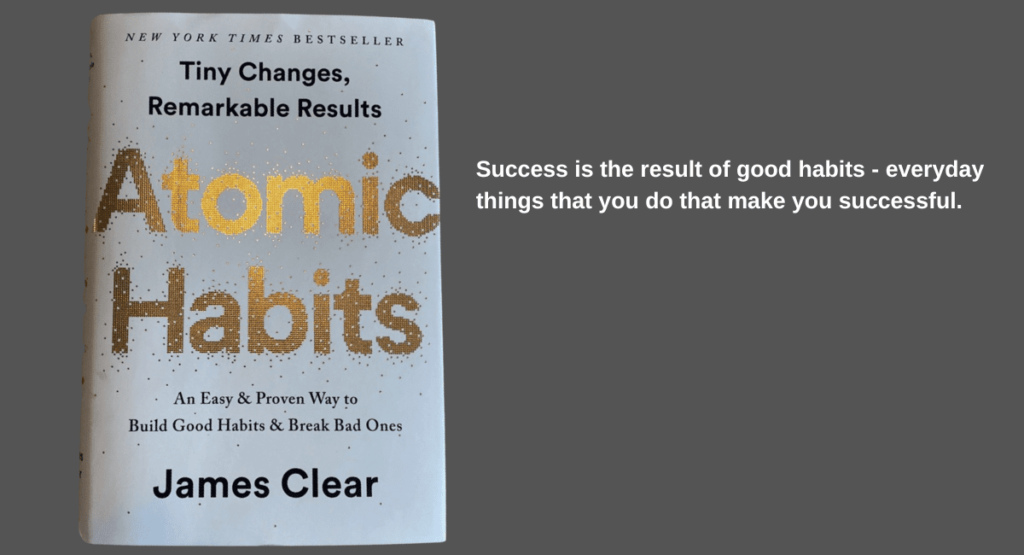
The book was published in 2018 and translated into more than 50 languages.
Atomic habit is a small and easy-to-do thing that can have much power. Habits are a part of a system that helps us grow and become better at something. Atomic habit is a significant part of that system.
Habits are powerful because they help us repeat the same actions without thinking about them. Habits make it easy for us to get things done and achieve our goals.
“Four Thousand Weeks: Time Management for Mortals” by Oliver Burkeman.
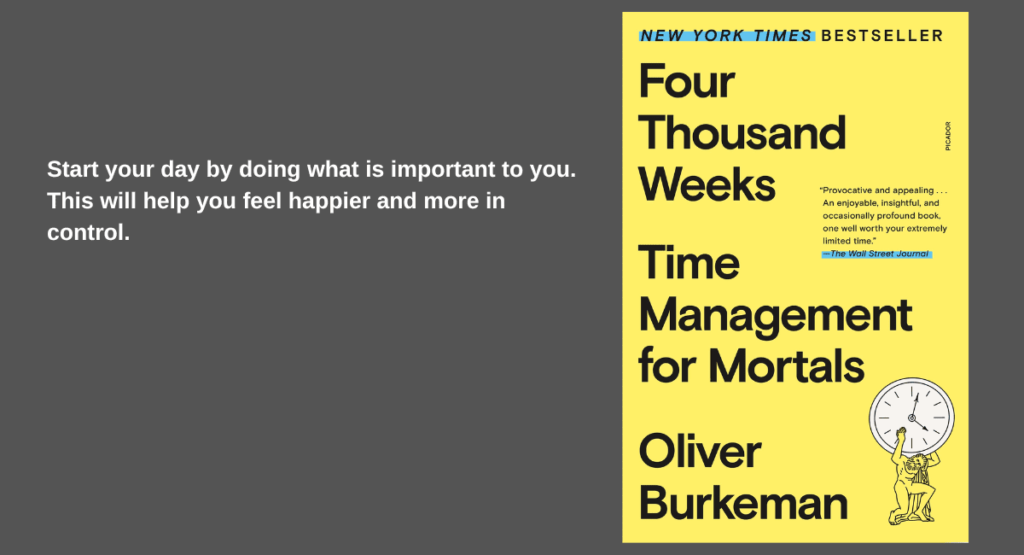
The book was published in August 2021.
We have a limited time, and we need to use it wisely. We can’t do everything, so we need to list important things and focus on those.
Make sure to focus on the most important tasks and not get distracted by the rest.
Make an effort to avoid taking on lower-priority tasks. They may not be as important as you think and may take up valuable time that you could use for more critical tasks.
“Eat That Frog! 21 Great Ways to Stop Procrastinating and Get More Done in Less Time” by Brian Tracy.
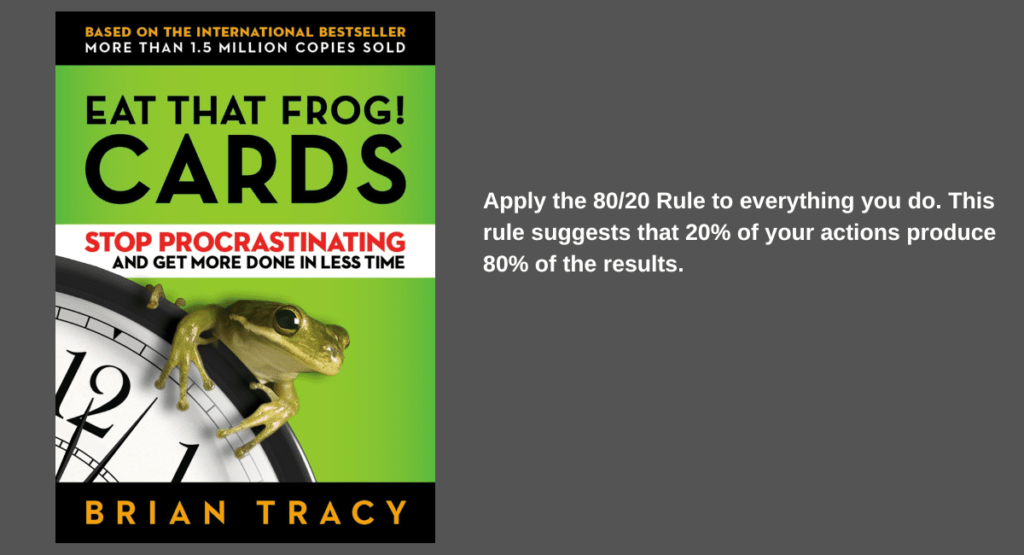
This book was published in 2001, and it helps the reader to understand procrastination and how to overcome it in 21 great ways.
The ability to make choices is a key factor in determining your success. This is because it determines which of the many things you can focus on.
When making choices, separating the important from the unimportant is essential. This will help you achieve your goals and be successful in life and work.
“First Things First: To-Do List for Living” by Stephen R. Covey, A. Roger Merrill, and Rebecca R. Merrill.
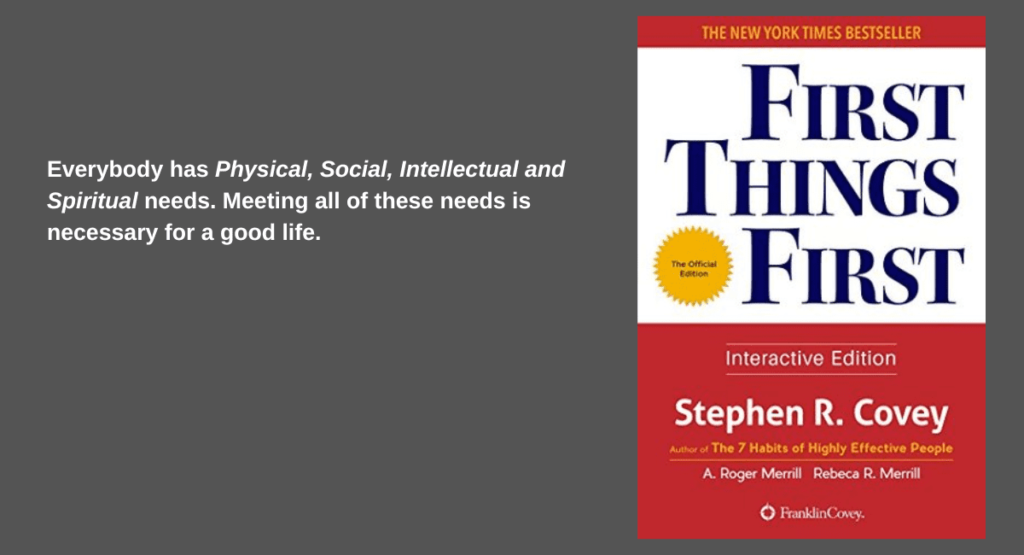
This book was published in 1994, and it helps the reader to prioritize what is essential and manage time effectively.
Before managing your time better, you need to know what is most important to you. When you know that, you can start making better decisions about how to spend your time.
When these things (Physical, social, intellectual, and spiritual) are in place, synergy occurs, and your inner fire is ignited. This will make you more productive and helps you achieve your goals.
“The One Thing: The Surprisingly Simple Truth Behind Extraordinary Results” by Gary Keller with Jay Papasan.
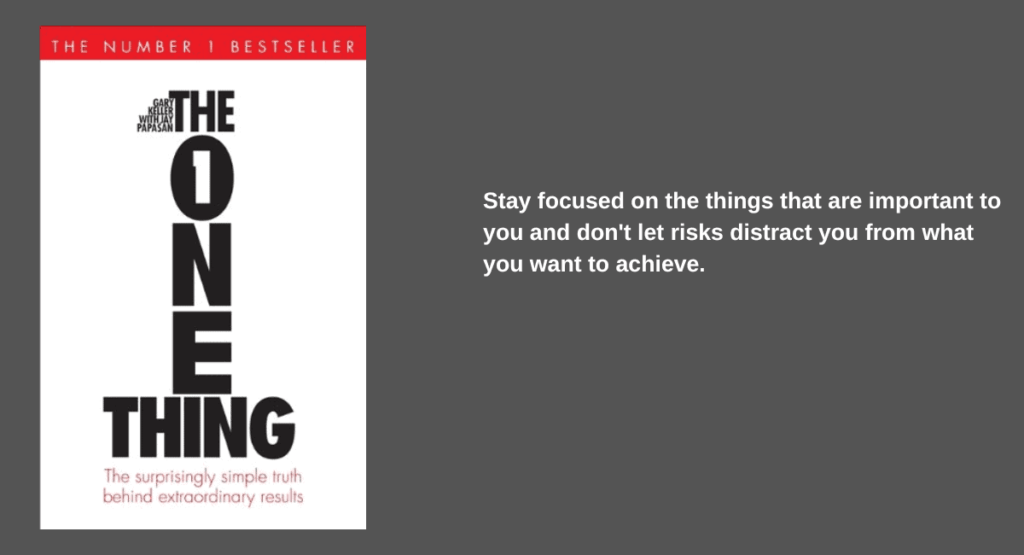
This book was published in 2013, and it helps the reader to focus on one thing at a time to achieve extraordinary results.
This is important because when you focus on one thing, you can give it your full attention. This allows you to achieve an impossible level of excellence when trying to focus on multiple things simultaneously.
The ONE thing is a program designed to help people achieve extraordinary results in all areas of their life. The ONE thing that has helped many people succeed in their work, personal lives, and spiritual practices.
“Getting Things Done: The Art of Stress-Free Productivity” by David Allen.
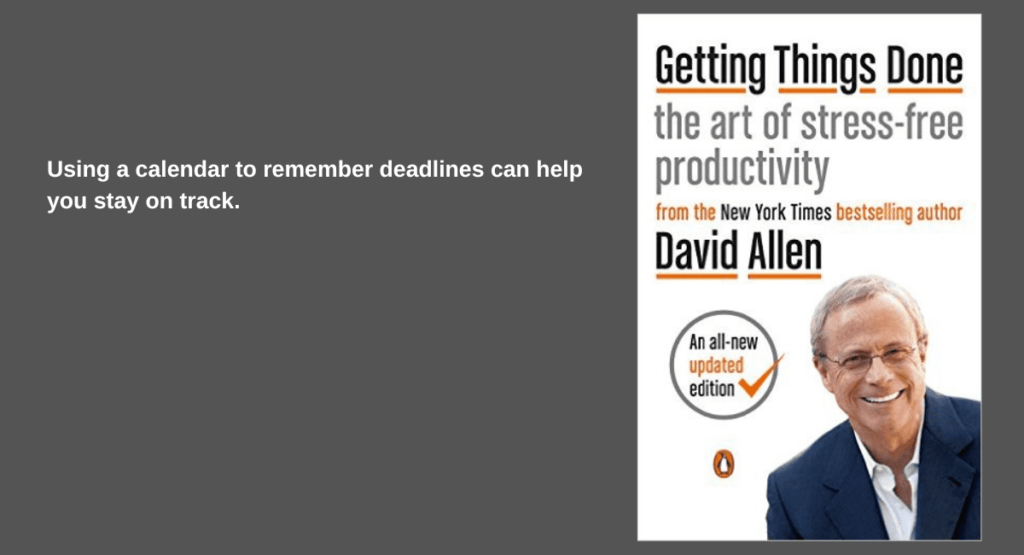
This book was published in 2002 and helped the reader to be productive by managing time, energy, and space.
You can be successful by thinking about what you want to achieve. It will help you stay focused and on track.
When trying to do something, always have the end goal in mind. This will make it easier to get started and reach your goals.
After understanding the risks of a project, the next step is to decide which task is most urgent at any given moment. By understanding the risks, the team can make better decisions about what to work on.
“The Now Habit: A Strategic Program for Overcoming Procrastination and Enjoying Guilt-Free Play” by Neil Fiore.
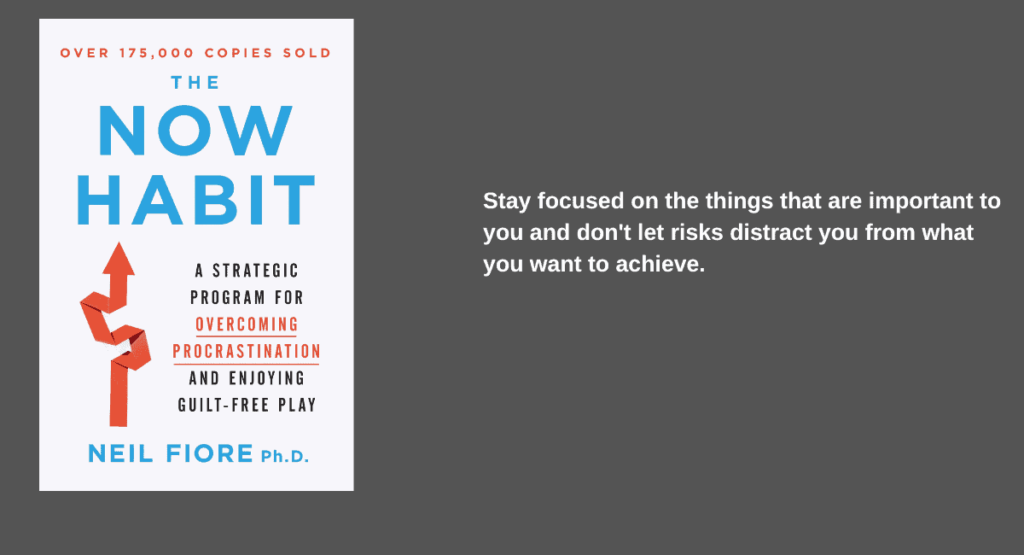
This book was published in 2007, and it helps the reader to understand procrastination and how to overcome it.
Procrastination is not a bad thing. It’s a way to deal with difficult situations. Procrastination can be unlearned and reprogrammed. This means that it can be changed so that it becomes easier to face complex tasks.
“Manage Your Day-to-Day: Build Your Routine, Find Your Focus, and Sharpen Your Creative Mind” by Jocelyn K. Glei.
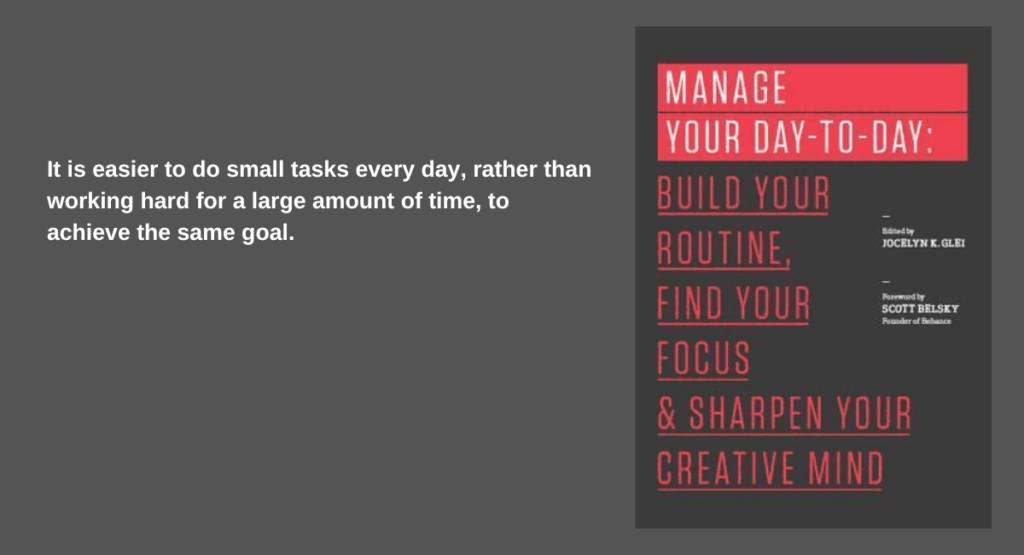
This book was published in 2013, and it helps the reader to be more productive by managing their time, energy, space, and attention.
Attention is our most precious resource. We need to use it wisely to spend it wisely. We need to understand how temptation works in our brains to control ourselves.
To be able to focus on essential tasks, we need to carve out time for them.
“Time Management from the Inside Out: The Foolproof System for Taking Control of Your Schedule–and Your Life” by Julie Morgenstern.
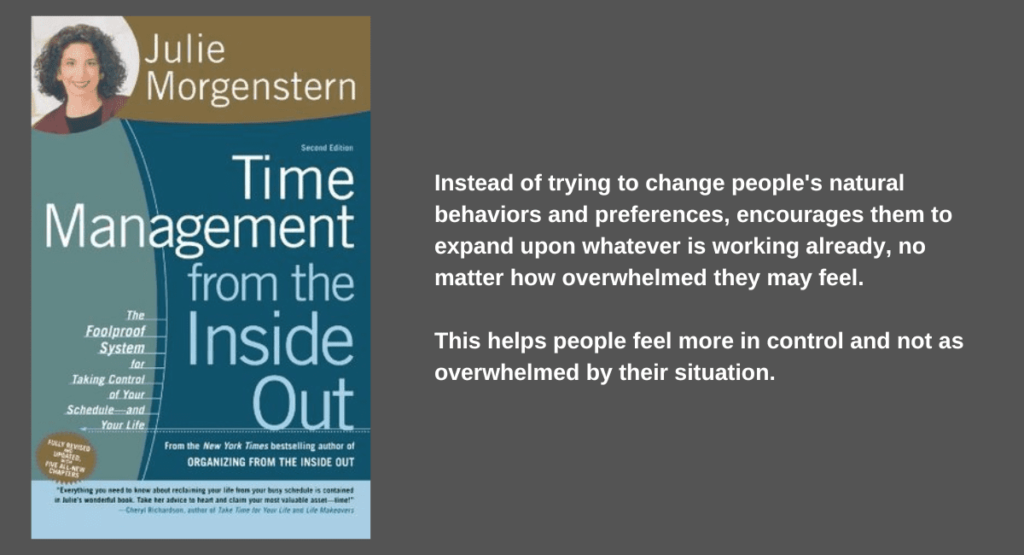
This book was published in 1996, and it helps the reader to understand their time management style and create a system that works for them.
Time management is a skill you can learn. In this revised edition, Morgenstern provides the ultimate tools to help you learn how to manage your time better. These tools include delegating, eliminating unnecessary tasks, and using technology to help you.
People make technical errors when they underestimate the length of a task. They also make mistakes when they don’t account for new external realities (like a new baby). And lastly, people have problems with perfectionism. This means they set too high of their standards and can’t achieve them.
“The Power of Full Engagement: Managing Energy, Not Time, Is the Key to High Performance and Personal Renewal” by Jim Loehr and Tony Schwartz.
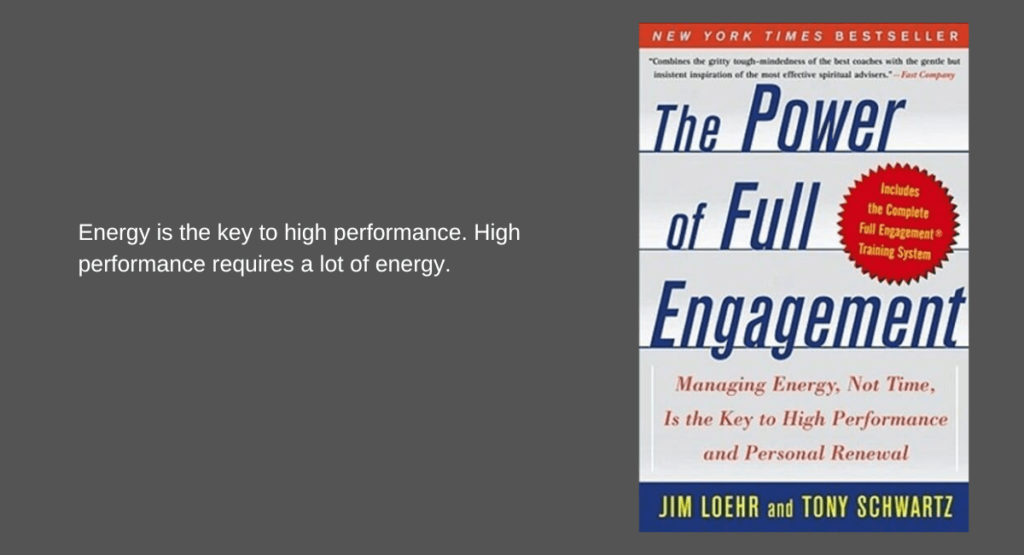
This book was published in 2003, and it helps the reader to understand how to manage energy, not time, for high performance and personal renewal.
Everything we do requires energy – from workplace discussions to the time we spend with our family. We must use our energy wisely to do our best work and have a good time.
How is The Best implementation of Time Management?
Implementing time management into personal routines requires personal changes, which may not be easy at first, but result in more free time and less stress overall.
Time management is organizing and planning how to divide one’s time between specific activities. Good time management enables people to complete more in a shorter period, lowers their stress levels, and improves their work-life balance.
You can use many techniques to manage time more efficiently:
- Creating to-do lists
- Scheduling
- Prioritizing
These are just a few examples. You can find what works best for the individual and stick with it— small changes can lead to significant improvements in productivity. Time management is an essential skill for focused success.
Proper application can help individuals make the most of their time and achieve their goals.
The benefits of effective time management
Most highly effective people have one thing in common: they know how to manage their time.
You can improve your time management skills with practice. There are many benefits to effective time management, including improved productivity, decreased stress levels, and greater efficiency.
People with time management skills are often more productive because they know how to prioritize their tasks and focus on what’s important.
Time management also leads to greater efficiency because you’re not wasting time on activities that aren’t helpful or productive.
Good skills in managing your time are a good start if you want to be more successful in your personal and professional life.
The resources help you, including books, articles, and online courses. By making time management a priority, you can start reaping the many benefits it has to offer.
Conclusion
It’s time to take control of your time! Implement one or all of these time management techniques and strategies from the best books for time management.
You can’t always change everything, but you may improve how you react to them. And that is a powerful first step.


